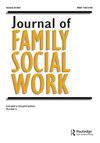Visitation and policy: implications for incarcerated individuals and their families
IF 0.7
Q3 SOCIAL WORK
引用次数: 0
Abstract
ABSTRACTThe United States has the highest-incarcerated population in the world. The U.S. houses 25% of the world’s incarcerated individuals. Interpretations of incarcerated visitation differ and focus on theoretical and empirical importance with social connections and their initiation via visitation shields damaging outcomes of disapproval and stereotype. An absent father due to incarceration can cause a burden on one’s family structure due to expenses related to legal costs, communication through telephone calls, transportation to visitation, and putting funds on the incarcerated individual’s account. Well-known strict correctional facility visiting atmospheres hold barriers such as limited visiting schedules, visitation processes, and offensive visiting searches which are all difficult and essentially impact the consistency and or experience of the visits. Reducing difficulties within a correctional facility by organizing visitations that can be child friendly for incarcerated fathers can help support positive relationship involvement with families.KEYWORDS: Familyincarcerationpolicyvisitation Disclosure statementNo potential conflict of interest was reported by the author(s).探视与政策:对被监禁者及其家庭的影响
摘要美国是世界上被监禁人口最多的国家。美国关押着世界上25%的囚犯。对监禁探视的解释各不相同,主要集中在理论和经验上对社会联系的重要性,以及通过探视屏蔽不赞成和刻板印象的破坏性结果。由于监禁导致的父亲缺席可能会给一个人的家庭结构带来负担,因为相关的费用包括诉讼费、通过电话进行的通信、前往探视的交通费用以及将资金转移到被监禁者的账户上。众所周知,监狱探视环境严格,探视时间表有限,探视程序有限,探视搜查令人不快,这些都是困难的,从根本上影响探视的一致性和体验。通过组织对被监禁的父亲有利的探视来减少教养设施内的困难,有助于支持与家庭建立积极的关系。关键词:家庭监禁政策探视披露声明作者未报告潜在的利益冲突。
本文章由计算机程序翻译,如有差异,请以英文原文为准。
求助全文
约1分钟内获得全文
求助全文
来源期刊

Journal of Family Social Work
SOCIAL WORK-
CiteScore
2.10
自引率
0.00%
发文量
4
期刊介绍:
Each issue of the Journal of Family Social Work contains peer reviewed research articles, conceptual and practice articles, creative works, letters to the editor, and book reviews devoted to innovative family theory and practice subjects. In celebrating social workers" tradition of working with couples and families in their life context, the Journal of Family Social Work features articles which advance the capacity of practitioners to integrate research, theory building, and practice wisdom into their services to families. It is a journal of policy, clinical practice, and research directed to the needs of social workers working with couples and families.
 求助内容:
求助内容: 应助结果提醒方式:
应助结果提醒方式:


